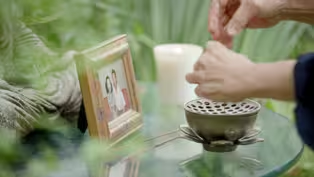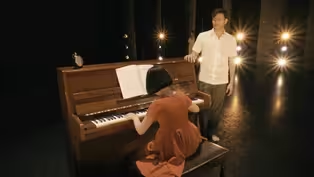
Art of Rehearsal
Clip: Season 3 Episode 3 | 5m 1sVideo has Closed Captions
Revolve Dance Project revives ballet and live music in this behind the scenes look.
Revolve Dance Project is a nonprofit company that brings musicians and dancers together to foster unique partnerships and creative growth. Look inside the artists' rehearsal process, from collaboration between dancers and musicians to the challenges of injury and fatigue.
Problems playing video? | Closed Captioning Feedback
Problems playing video? | Closed Captioning Feedback
Art Inc. is a local public television program presented by Ocean State Media

Art of Rehearsal
Clip: Season 3 Episode 3 | 5m 1sVideo has Closed Captions
Revolve Dance Project is a nonprofit company that brings musicians and dancers together to foster unique partnerships and creative growth. Look inside the artists' rehearsal process, from collaboration between dancers and musicians to the challenges of injury and fatigue.
Problems playing video? | Closed Captioning Feedback
How to Watch Art Inc.
Art Inc. is available to stream on pbs.org and the free PBS App, available on iPhone, Apple TV, Android TV, Android smartphones, Amazon Fire TV, Amazon Fire Tablet, Roku, Samsung Smart TV, and Vizio.
Providing Support for PBS.org
Learn Moreabout PBS online sponsorshipt music) (bright music continues) - What is Revolve?
Revolve is a collaborative performing arts nonprofit company that's dedicated to bringing musicians and dancers together to form working relationships between the artists.
- I almost feel like in rehearsals, I have, like, so much fun.
Like, I love when people are watching, and I feel like I'm just, I dunno, I feel less nervous in rehearsals, but before the show time, I definitely feel myself get nerves before stepping on stage.
(gentle piano music) - So I think every process, every, like, set of rehearsals gets to a point where it's like we're running things over and over, your body's getting fatigued.
- You know, there's the old saying, practice and then you can kind of forget about it once you get on stage, 'cause if you get on stage and you're still too consumed with, you know, for me, it's this which stick goes where when?
If you're still in that head space, you're probably going to fall on your face.
(players chattering faintly) The first rehearsal was great.
Most of us have played music together.
We kind of know how we operate.
(bright music) - Ugh, the worst part of rehearsal is the pain, sometimes, the injuries, the repetition of the same thing over and over, sometimes.
I'm still sort of dealing with an injury.
So we think that I had a series of subluxations in my left lower rib.
Subluxation, from what I understand, means that the rib went out of place and then back in, so it's kind of like a dislocation that pops right back into place quickly.
(dancers chattering faintly) - But I think rehearsals, it's just, be flexible, but come prepared.
And then when you perform, don't forget to have fun.
- In rehearsal, you kind of discover what the piece actually is because you know, everything in theory that I try to put on the page might change when the real sounds are happening in the room, when real people are playing the various parts.
- Musicians and dancers don't often get to collaborate, because it usually takes two different organizations coming together and getting their schedules aligned and you know, finding the funding to make that sort of thing happen, so this is really the only company of its kind that I know of in Rhode Island that's really focused on dance and music equally.
(gentle cello music) - Dance and music, and particularly drumming, used to have a much more intrinsic connection.
(bright music) 'Cause for me as a drummer, you know, how it fits into the historical context with dance and, you know, culture.
- We always have to be aware that we're writing for dance.
(performers chattering faintly) - I would say we start composing a few months ahead of time and send it to the choreographers.
(bright music) Then they, you know, mold the clay, so to speak, and start thinking about how it's gonna pair with the music.
- Okay, well we just changed that, so I think we maybe just do it a few times.
- The artists of Revolver are able to, like, grow so much in their own artistry, just from collaborating with a different type of artist.
- Like, it's sort of like important, and not about this as much as nothing.
- And I think because we all kind of are interconnected and we see each other's lives, we have a bit more appreciation for what it takes to come here and do this.
And when you get to the performance, it's really all about letting that, like, (bright music) muscle memory show out, and actually feeling the moment in the lights and feeling the energy from the audience and allowing that to really amplify your voice.
- Another thing with Revolve that's great is that everybody is very, you know, they're super fun to work with and they're very positive, but they're also pro.
So there's a lot of laughs and it's pretty light.
But then we get together and play, and it's ready.
(audience applauds and cheers)
Video has Closed Captions
Clip: S3 Ep3 | 7m 44s | Donna Weng Friedman talks with us about the process of her award-winning short film. (7m 44s)
Video has Closed Captions
Clip: S3 Ep3 | 12m 3s | Donna Weng Friedman shares her parents’ story of immigration to the United States in a short film. (12m 3s)
Providing Support for PBS.org
Learn Moreabout PBS online sponsorshipSupport for PBS provided by:
Art Inc. is a local public television program presented by Ocean State Media

















